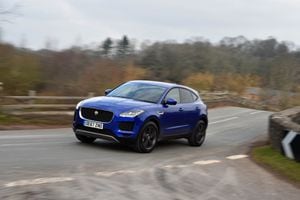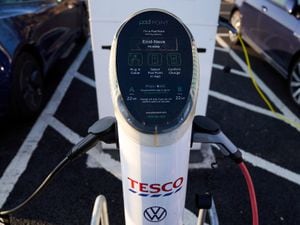JLR benefits as April car sales rise – but diesel still drags
Jaguar Land Rover has been one of the big winners after new car sales surged in the UK last month – but experts warn the industry's woes aren't over.

The 10.4 per cent hike in registrations in April is seen as the market rebalancing following the disruption caused by the sharp rise in car tax last year, rather than any return to growth after month of falling figures.
Jaguar Land Rover did better than the market as a whole, however. Its Jaguar vehicles enjoyed a 39.4% leap in sales to 2,414 in April, while Land Rover was up more than 22 per cent to 5,027.
The West Midlands-based luxury carmaker, which makes its engines at the i54 site in Wovlerhampton, did better than rivals BMW and Mercedes-Benz which both saw sales fall in April.
The latest industry figures from the Society of Motor Manufacturers and Traders (SMMT) showed demand for diesels continued to fall in April, while demand for alternatively fueled vehicles such as electric cars soared 49 per cent.
But the SMMT pointed out that the new car market was still down 8.8 per cent so far this year
Mike Hawes, chief executive of the SMMT, said, “It’s important not to look at one month in isolation and, given the major disruption to last April’s market caused by sweeping VED (Vehicle Excise Duty) changes, this increase is not unexpected.
"While the continuing growth in demand for plug-in and hybrid cars is positive news, the market share of these vehicles remains low and will do little to offset damaging declines elsewhere.
"Consumers need certainty about future policies towards different fuel types, including diesel, and a compelling package of incentives to deliver long-term confidence in the newest technologies
The SMMT figures show 167,911 new cars were registered last month.
Demand was affected by a number of factors, including the timing of Easter, which meant two additional selling days this April, and March’s adverse weather, which pushed some deliveries into April. Most significant, however, were the VED changes that came into force last April, causing a 'pull forward' into March 2017 and a subsequent depressed April market.
The SMMT added that April figures this year "paint a mixed picture", with private demand growing 26.3 per cent, while the fleet market remained stable at 0.9 per cent. However, business registrations saw a significant decline, falling 12.9 per cent compared with the same month last year.
Despite all this, the Ford Fiesta remains the UK's favourite car, with the VW Golf and Nissan Qashqai in second and third place.
Demand for petrol cars grew in April, up 38.5 per cent, while diesel registrations continued the recent trend, declining 24.9 per cent.
Richard Jones, managing director of motor finance provider Black Horse, which is part of Lloyds Banking Group, said the "ongoing confusion" around fuel choice remains "a major concern".
He added: "The public policy debate on diesel has led many customers to the mistaken view that the biggest issue to be addressed in reducing emissions is the removal of diesel cars from the UK's roads.
"Rather, the most important issue is actually the more general removal of older, more polluting cars - whether petrol or diesel."
Andrew Hooks, chief operating officer of independent car buying site carwow, said: “Today’s results do not mark a recovery. The reality is, the car industry - and the consumer - need clarity of strategy from the government, including a practical and actionable plan to manage the long term transition from fossil fuel to alternatives over the next 20 years.
"This plan must include petrol and diesel at its core while we wait for the strategy to deliver the advances in infrastructure and technology needed to make alternatives a plausible reality for the majority of car drivers.
“Without this, consumers still lack the confidence to buy because they are inundated with ill-informed messages casting all diesels as bad - messages that the government has repeatedly failed to correct. While those looking to go green lack the reassurance that the UK is set up for an electric future, with the relative lack of publicly available charging points and vague promises of investment in the electric infrastructure.
“The industry continues to seek new ways to engage the car buying public and it’s significant that online leads are growing year on year. Where every sale is precious, today’s dealers are working hard to get in front of potential customers however they are choosing to browse and buy their new car.”





